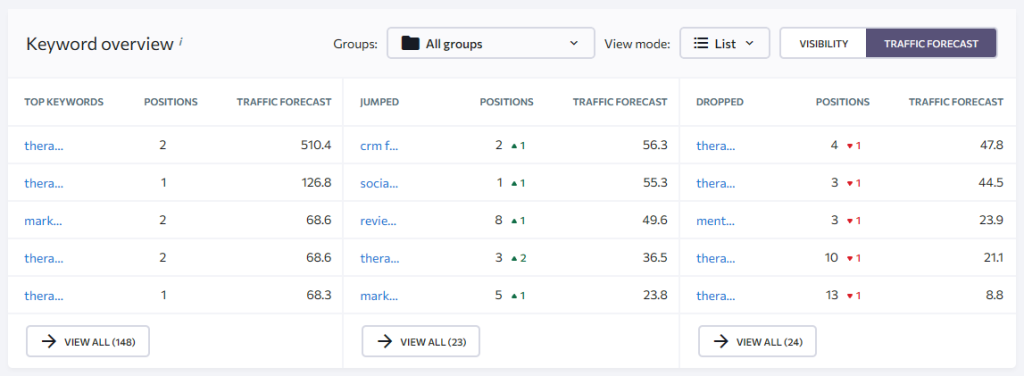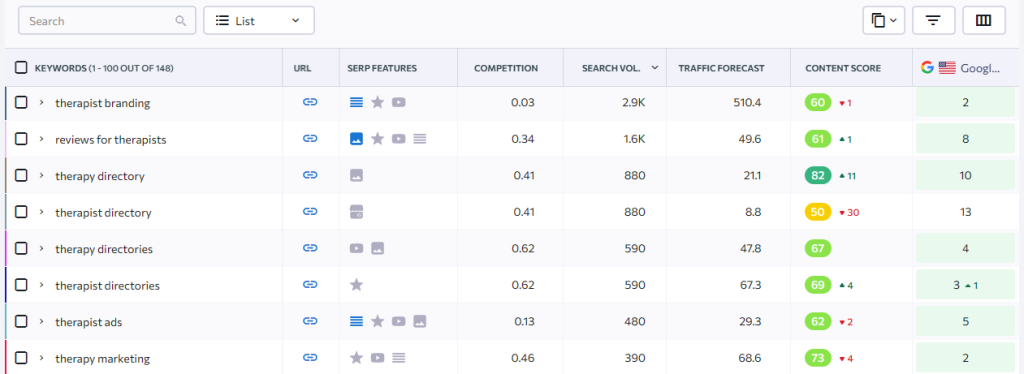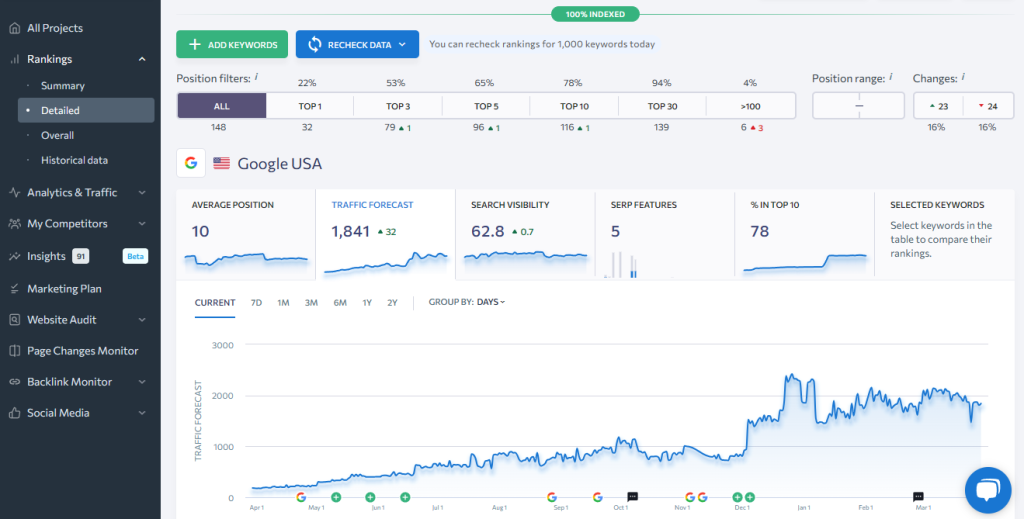Last modified on: April 8th, 2024
Keyword rank tracking is essential for anyone looking to improve their SEO results, providing clear insights into how your site competes online. It helps you understand your content's visibility, performance, and competitors in the search engine results.
In this post, we'll dive into how leveraging keyword rank tracking can significantly boost your SEO efforts, providing insights and strategies to increase visibility and achieve better search outcomes.
With the help of a rank tracking tool, you can enhance your approach to secure top positions in search results.
1. Overviewing SEO Performance
Quick Assessment
An overview of your keyword rankings can act like a health check for your SEO efforts, giving you a quick snapshot of where your website stands. This broad perspective helps you gauge the effectiveness of your SEO at a glance, highlighting which keywords are performing well and which are falling short.

It’s an essential step in understanding the bigger picture of your digital presence, providing a clear, consolidated view of your search engine performance across multiple keywords and search terms.
Prioritizing Actions
Once you have this overview, you can start prioritizing your SEO tasks. It allows you to see which high-potential keywords are on the cusp of ranking on the first page and might only need a slight push. It also helps in identifying underperforming keywords that require a revamp in strategy.
By focusing on these critical areas, you can allocate your resources efficiently, dedicating time and effort to the tasks that will have the most potential impact on your SEO performance. This targeted approach ensures that you're not just busy with SEO, but effective at it, driving the needle where it counts the most.
2. Leveraging Historical Data
Analyzing Trends
Understanding how your website performs over time is crucial in the fast-paced world of SEO. Historical data from keyword rank tracking offers a window into the past, showing how changes in your strategy, updates to your website, or shifts in market trends have influenced your search engine rankings.
This long-term view helps identify what works and what doesn't, guiding you to double down on successful tactics and rethink those that haven't paid off.
The screenshot below shows an example tracking position history using SE Ranking, illustrating the impact of SEO actions and external factors on website visibility in search results. By studying these patterns and the available metrics, you can anticipate future trends and prepare more effectively.

Strategic Adjustments
With a clear understanding of historical trends, making strategic adjustments becomes much more straightforward. Historical keyword data allows you to pinpoint the exact moment when a ranking change occurred.
Was it after a website update, a major content release, or an algorithm change by search engines? Knowing this can help you adapt your SEO strategy to either capitalize on successful tactics or correct course when necessary.
For example, if you notice a consistent uptick in rankings following certain types of content updates, it could be a signal to produce more of that content.
Conversely, if a drop in rankings correlates with specific changes, you have a clear indication of what to avoid.
Utilizing historical data effectively means your SEO strategy is always informed, agile, and aligned with what delivers the best results.
3. Maximizing SERP Positioning
Understanding Your Position
Understanding the exact standing of your website in search results is fundamental, as it significantly influences how prominently your site appears to potential visitors.
A strong presence on the initial pages, especially the first, can drastically increase traffic and the likelihood of conversions, highlighting the stark contrast in visibility between the top rankings and those even slightly lower.
Strategies for Improvement
To climb up the SERP ladder, actionable strategies are necessary. A SERP overview serves as a starting point, where you can drill down into individual keywords to assess wins and losses.

Leveraging SEO automation with the help of rank tracking software, streamlines the process of analyzing SERP positions. These tools can automatically monitor your rankings for thousands of keywords, providing actionable insights that guide strategic adjustments. Here's how you can leverage this data:
Optimize On-Page SEO: To ensure that your content matches the search intent of your target keywords, focus on fine-tuning your titles, meta descriptions, and headers. These adjustments are factors in improving your keyword rankings and click conversions, and rank tracking data can help you measure their impact over time.
Improve Content Quality: High-quality, relevant content is king when it comes to SEO. Utilize your keyword rank tracking insights to pinpoint which topics engage your audience the most. Act on this data by deepening the quality and breadth of your content to see a potential uptick in rankings.
Focus on User Experience (UX): Prioritize making your site easy to navigate and quick to load, as this can keep visitors on your site longer and decrease bounce rates. By using rank tracking, you can observe how enhancements to user experience correlate with improvements in your SERP positions.
Build Quality Backlinks: Earning backlinks from reputable sources, along with crafting a robust network of internal links, tells search engines that your content is authoritative and relevant. An uptrend in your keyword rankings after securing quality backlinks or optimizing internal links is a strong indicator of the success of these efforts.
Employing these tactics, guided by accurate keyword ranking data, positions you to advance your SERP standings effectively. Every method offers a defined route to boost your website health and performance in search engine results.
4. Detailed Keyword Analysis
Deep Diving into Keywords
To truly optimize your SEO strategy, a surface-level understanding of keywords is not enough. A detailed keyword analysis digs deeper, exploring not just the popularity of a term but its context, competition, and relevance to your content.
It's about discovering the nuances of how specific keywords perform and their alignment with user intent. This granular view into keyword specifics allows you to tailor your content strategy with precision, targeting areas with the highest potential for ROI.
Actionable Insights
The real power of keyword rank tracking lies in the actionable insights you can extract from the data alongside keyword research. Each keyword's performance metrics serve as a compass, pointing toward opportunities for optimization and refinement.
For instance, if certain keywords are bringing traffic but not conversions, it may indicate a mismatch between the user's search intent and your content. On the other hand, keywords with high conversion rates but low traffic are hidden gems worth focusing on to attract more qualified visitors.
By transforming this data into actionable steps, such as optimizing high-potential content or adjusting meta tags for better alignment with search queries, you can make informed decisions that propel your SEO forward.
5. Utilizing Tables for Analysis
Comprehensive Keyword Insights
Tables that display keyword rankings provide an in-depth look at SEO performance, allowing for a detailed analysis that goes beyond basic metrics. These tables can break down rankings by various factors, such as search volume, competition level, and changes over time, offering a multifaceted understanding of where your SEO stands.

By having all this information organized in one place, you can more easily spot patterns, track progress, and understand the nuances of each keyword's contribution to your site's overall SEO health.
Strategic Planning
A table filled with comprehensive keyword data becomes a crucial tool for strategic planning. It allows you to segment your analysis and focus on different aspects of your SEO, from identifying which pages might benefit from updated content to understanding which keywords could use a boost from backlinking efforts.
This level of detail is instrumental in crafting a nuanced SEO strategy that targets specific goals, such as improving rankings for high-value keywords or increasing the visibility of key pages. Ultimately, these tables are not just repositories of data but roadmaps for strategic action in the SEO landscape.
6. Gaining the Competitive Edge
Competitive Analysis
Leveraging rank tracking for competitive analysis offers invaluable insights into your rivals’ SEO strategies. By monitoring keyword positions of competitors, you can uncover which tactics are driving their search success and identify gaps in your own strategy.
This analysis not only reveals the keywords they're targeting but also provides a glimpse into their content quality, backlink strategy, and overall SEO health.
Understanding these elements allows you to benchmark your performance and set clear targets for improvement, ensuring you stay competitive in the search landscape.
SE Ranking provides an effective way to track 5-20 competitor sites for a target set of keywords and compare ranking changes side-by-side. This makes it easy to see fluctuations in rankings across many competitors quickly in one interface.
Adapting and Overcoming
Armed with insights from your competitive analysis, you can refine your SEO tactics to address weaknesses and capitalize on new opportunities.
For instance, if you notice competitors ranking well for keywords you hadn’t considered, it might be time to expand your keyword list and content strategy.
Additionally, analyzing the types of content and backlinks driving their rankings can inspire similar efforts in your strategy. The key is to not just mimic but to innovate, finding unique angles and untapped niches that can give you an edge.
By continuously adapting your strategy based on competitive insights, you maintain a dynamic approach that evolves with the market, ensuring long-term SEO success.
7. Summarizing Keyword Performance
Reporting and Communication
Effective communication is a cornerstone of SEO management, especially when conveying the success of your efforts to stakeholders. Summarizing keyword performance into comprehensive reports distills complex data into digestible insights.

This helps in clearly presenting the progress and impact of your SEO strategy, ensuring that everyone from clients to team members can easily understand the achievements and areas needing attention.
A well-crafted summary can bridge the gap between SEO professionals and stakeholders, fostering informed discussions about the direction and tactics of future SEO endeavors.
Decision-Making
When it comes to steering the SEO strategy, decision-makers need concise and clear data to act swiftly. Summarized keyword performance data can provide that clarity, highlighting trends, opportunities, and threats in a format that's quick to analyze.
This streamlined view enables SEO teams to make data-driven decisions with confidence and speed, ensuring that the strategy is adaptive and responsive to the ever-changing landscape of search engine algorithms and market conditions.
Final Thoughts on Keyword Rank Tracking
Keyword rank tracking stands as a critical tool in the dynamic landscape of SEO, offering a strategic advantage that goes beyond simple performance monitoring to significantly enhance search engine visibility.
In this post, we've shown how using rank tracking can create new opportunities for your website and SEO efforts. It can help you understand how changes over time affect your rankings, guide you in making informed decisions on SEO tactics, and show you how you stack up against competitors.
Effective rank tracking is about making smart moves to boost your SEO results, leading to more website visitors, better engagement, and more conversions. It also combines detailed analysis, smart planning, and the ability to adjust as you go.
Through keyword rank tracking, you get essential insights that shape every part of your SEO strategy, making sure your efforts make a real impact and match up with your main goals. Rank tracking provides valuable insights for trend analysis, optimizing content, and understanding competitors to help you achieve better SEO results.
Think of keyword rank tracking as your compass in the vast world of SEO, guiding you to strategies that make your website more noticeable, effective, and successful.